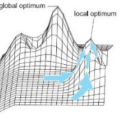Autonomous vehicles must be comprehensively evaluated before deployed in cities and highways. However, most existing evaluation approaches for autonomous vehicles are static and lack adaptability, so they are usually inefficient in generating challenging scenarios for tested vehicles. In this paper, we propose an adaptive evaluation framework to efficiently evaluate autonomous vehicles in adversarial environments generated by deep reinforcement learning. Considering the multimodal nature of dangerous scenarios, we use ensemble models to represent different local optimums for diversity. We then utilize a nonparametric Bayesian method to cluster the adversarial policies. The proposed method is validated in a typical lane-change scenario that involves frequent interactions between the ego vehicle and the surrounding vehicles. Results show that the adversarial scenarios generated by our method significantly degrade the performance of the tested vehicles. We also illustrate different patterns of generated adversarial environments, which can be used to infer the weaknesses of the tested vehicles.
翻译:自主车辆在被部署到城市和高速公路之前必须进行全面评价。然而,对自主车辆的现有评价方法大多是静态的,缺乏适应性,因此通常在为测试车辆提出具有挑战性的设想方面效率低下。在本文件中,我们提议一个适应性评价框架,以便在深入强化学习产生的敌对环境中有效评价自主车辆。考虑到危险设想的多式性质,我们使用混合模型来代表不同的当地最佳多样性。然后,我们使用非对称贝叶斯方法将对抗性政策组合在一起。拟议方法在典型的车道改变假设中得到验证,这种假设涉及自用车辆与周围车辆之间频繁的互动。结果显示,我们的方法所产生的对抗性假设大大降低了测试车辆的性能。我们还说明了生成的对抗性环境的不同模式,这些模式可用来推断测试车辆的弱点。




